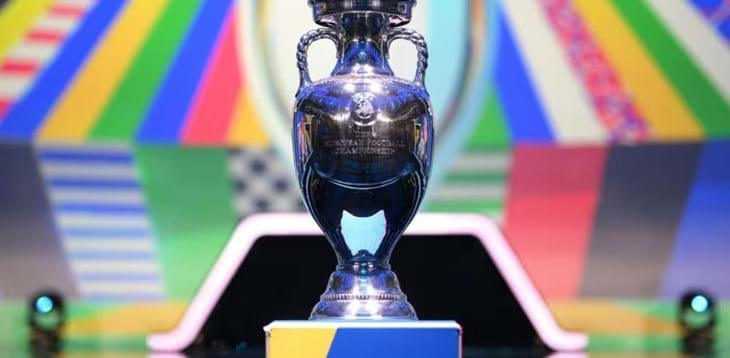
Italy beat Israel 4-5 thanks to Tonali's stoppage time winner
08 September 2025
Thursday, November 30, 2023

FIGC President Gabriele Gravina, General Secretary Marco Brunelli, Azzurri Head Coach Luciano Spalletti and Delegation Head Gianluigi Buffon will all attend the Elbphilharmonie in Hamburg on Saturday 2 December (18:00 CET) for the UEFA EURO 2024 draw. Having qualified as runners-up in Group C behind England, reigning champions Italy, who will be in pot 4, are ready to discover their group stage opponents. In addition to the hosts Germany, the ten group winners (Albania, Belgium, Denmark, England, France, Portugal, Romania, Spain, Türkiye, Hungary) and the ten runners-up (Austria, Croatia, Czech Republic, Italy, Netherlands, Scotland, Serbia, Slovakia, Slovenia, Switzerland) are the 21 teams who have already made it to the finals. The final three spots will be decided in the play-offs.
The 24 teams will be divided into four pots based on their standings and final points tally from qualifying. Hosts Germany are in pot 1 (in position A1) with the other five best-ranked teams. The other five group winners and the best-ranked runner-up (Austria, 19 points) are in pot 2, while pot 3 is comprised of the other six second-placed teams. Pot 4 contains the three runners-up with the lowest final points total, including Italy, and the three teams who will qualify through the play-offs.
Pots as follows:
Pot 1: Germany, France, Portugal, England, Belgium, Spain
Pot 2: Denmark, Türkiye, Hungary, Albania, Romania, Austria
Pot 3: Scotland, Netherlands, Croatia, Czech Republic, Slovenia, Slovakia
Pot 4: ITALY, Serbia, Switzerland, Play-off (3)
UPCOMING FIXTURES FOR THE AZZURRI. The Men’s National Team will play two friendlies in the international window in March (opponents TBC). The group will then reconvene between the end of May/beginning of June once club football has concluded both at a domestic (15 May Coppa Italia final, 26 May last matchday of Serie A) and European level (finals in the three major UEFA club competitions to be held between 19 May and 1 June). Ahead of knowing whether any Italian clubs will make it to a potential final, there are currently 19 days between the end of Serie A and the start of the Euros, during which the players will have the necessary break before a training camp in Italy with two friendlies. Then, it’ll be time to depart for Germany. This is the same timeframe as EURO 2020 (Serie A finished on 23 May and Italy played the opening game on 11 June, 19 days apart) and a far cry from the lengthy waits up until the 90s. The record wait between the end of the domestic season and the start of a summer international tournament was in 1994: 48 days wait until the World Cup in the USA. The final 23-man squad list will be announced seven days before the tournament starts at the latest.
VENUES AND DATES. EURO 2024 will start on 14 June with the opening game in Munich, which will involve hosts Germany. The official ball for the tournament is adidas’ Fußballliebe and the tournament’s mascot is Albärt. There are eleven host cities: Berlin (Olympiastadion / 70,000 capacity, final venue), Cologne (Cologne Stadium / 47,000), Dortmund (BVB Stadion Dortmund / 66,000), Dusseldorf (Düsseldorf Arena / 47,000), Frankfurt (Frankfurt Arena / 46,000), Gelsenkirchen (Arena AufSchalke / 50,000), Hamburg (Volksparkstadion / 50,000), Leipzig (Leipzig Stadium / 42,000), Munich (Munich Football Arena / 67,000, opening game venue), Stuttgart (Stuttgart Arena / 54,000).
The games in the six groups will take place at a varying number of venues (from four to six, but only two for Germany’s group), geographically divided into two areas: centre-north and centre-south. In detail: Group A is the one with the least amount of travel, in terms of number and distance, because it will take place between Cologne and Stuttgart (two cities in the centre-south separated by approximately 360 km), plus the opening match with Germany playing in Munich, the southernmost venue of the tournament. On the other hand, the areas in which the other groups will take place are wider: Groups B, D, and F will be concentrated in the cities of the centre-north (Hamburg, Berlin, Dortmund, Dusseldorf, Leipzig, Gelsenkirchen) and there will be six different venues for the Group B matches, 5 for Group D, 4 for Group F. Group C and E games, on the other hand, will take place across five venues in the centre-south (Frankfurt, Cologne, Munich, Stuttgart, plus Gelsenkirchen - Group C - and Dusseldorf - Group E).
Here is the complete breakdown
Group A: Cologne and Stuttgart (+ opening match Munich)
Group B: Hamburg, Berlin, Dortmund, Dusseldorf, Gelsenkirchen, Leipzig,
Group C: Cologne, Frankfurt, Gelsenkirchen, Munich, Stuttgart
Group D: Hamburg, Berlin, Dortmund, Dusseldorf, Leipzig
Group E: Cologne, Dusseldorf, Frankfurt, Munich, Stuttgart
Group F: Hamburg, Dortmund, Gelsenkirchen, Leipzig
The group stage of the tournament will take place from 14 to 26 June. The top two and the four best third-placed teams will advance to the round of 16 (two per day between 29 June and 2 July). Then, the quarters (5 and 6 July, two per day), the semi-finals (9 and 10 July, one per day) and the final (14 July) will take place.